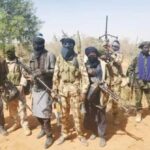By Gift Chapi Odekina
The Presidential Implementation/Advisory Committee for the implementation of the recommendations of the Reform Committee on the Ministry of Defence and Armed Forces of Nigeria has called for the integration of civilians into a new security architecture to address challenges in the country’s security.
Maj Gen Alwari Kazir rtd, Chairman of the Committee while on an advocacy visit to the House of Representatives Committee on Defence in Abuja said the national and global strategic environment within which the Armed Forces operate have significantly changed in the last two decades.
He said the way the Nigerian Armed Forces are organized, trained, equipped and managed by the Ministry of Defence was based on the need to confront conventional threats, making it imperative to reform the defence and security architecture to match contemporary challenges.
He said a requisite mix of civilians and the military into the Ministry of Defence and the Armed Forces was necessary to check the myriad of security problems facing the country today.
“The end of the cold war has enhanced globalization with its attendant features of interdependence and internationalization. Regrettably, globalization has also precipitated and brought about actors in the international and international stages in the form of non-state actors. These new actors participate in different native engagements ranging from religious extremism to ethnic chauvinism etc, leading to a series of conflicts. These are things that are happening the world over.
“On that hand, despite some recent adjustment, the way our armed forces are organized, trained, equipped and managed by the Ministry of Defence was based on the need to confront conventional threats. This makes the reform of our defence and security architecture imperative. Today in effect, the Ministry of Defense and the Armed Forces of Nigeria need to be properly organized, structured, manned with the required mix of military and civilian personnel as is the global best practice in almost all countries, especially developed countries.
“Reforming the Ministry of Defence and Armed Forces of Nigeria will also ensure that we have an Armed Forces that is affordable for the national economy while sufficient in size, structure, training and equipment to respond effectively to both conventional and asymmetric warfare. The need to re-position the AFN to meet its national and international obligations particularly at this time when a myriad of security challenges are confronting our country is apt and timely.
“In the final analysis, we are working towards an integrated Ministry of Defence with a requisite mix of civilian and military staff. An Armed forces that is well structured, adequately sized for the national economy and adequately manned, trained and equipped to meet contemporary security challenges. This is repeated for the sake of emphasis.
“We are also looking at an Armed Forces that is adequately financed and resourced with assurance for value for money. We are also looking for an armed forces that looks towards self-sufficiency, at least in some areas of local production of arms, ammunition, equipment and services. We are also working toward an armed forces that operates within the confines of democratic control and in compliance with domestic and international laws.”
He said no effort at the reform of the Ministry of Defence and the Armed Forces of Nigeria can succeed without the support and guidance of the legislative branch and called for the support of the lawmakers.
Chairman of the House Committee on Defence, Babajimi Benson, said the 9th House of Representatives is concerned about the certain issues that tend to affect the operations of the Armed Forces of Nigeria, including , among others, the weak civil-military relations and the negative perception by the public.
This, he said, is evident in the controversies surrounding the EndSars protest of October 2020 and the role of the military.
He said the House believes effective Civil-Military relations are vital for success in protecting lives and promoting national interest as well as harmony in the society.
Benson said the House is deeply concerned about reforms in the defence sector and believes it is clearly one of the ways to improve the security architecture of the country.
“It is in the light of this that the Speaker of the House of Representatives, Rt. Honourable Femi Gbajabiamila set up a committee to organise a National Security Summit with a view to conducting a holistic legislative review of the National Security Policy, provide an avenue for robust conversations among critical stakeholders in the national security space and make recommendations that will inform both Executive and Legislative reforms.
“The recommendations have since been commissioned and presented to the Executive for necessary action. Furthermore, the House Committee on Defence has successfully sponsored and ensured the passage of the Armed Forces Support Trust Fund Bill to provide for additional funding for the Armed Forces. This bill has since been transmitted to the Senate for concurrence and passage before the presidential assent. In addition to these innovative measures already taken by the House are several other legislative interventions all geared towards ensuring the safety of lives and property of Nigerians,” he said.
He however, expressed worry about alleged human rights abuses both within and outside the Armed Forces.
Chairman of the House Committee on Army, Abdulrazak Namdas, stressed the need to deal with overlapping mandates amongst security agencies.
He said they were going to carry out legislation to address such challenges.
Chairman of the House Committee on Air Force, Shehu Koko, reform of the Ministry of Defence and the Armed Forces was a welcome development.
END



